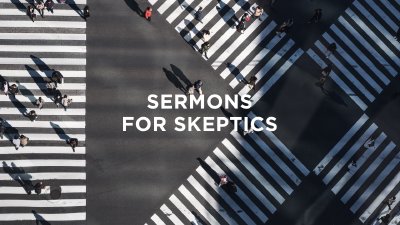


Sermons for Skeptics
Let's take our doubts and difficulties seriously
Q&R for Why Hell?
November 20, 2022 • Matthew 25:31–46
Five short responses clarifying the preacher's interpretation of the passage, about whether God can be present in hell, about why faith is the mechanism for salvation, about predestination, and about hopelessness... also three longer responses about how God can hold people accountable if they haven't heard the Gospel, about how there could be no sadness in heaven if people we love aren't there, and about a grab bag of questions generated by reading NT Wright and Karl Barth.
Why Hell?
November 20, 2022 • Walter Henegar • Matthew 25:31–46
The doctrine of hell is repugnant to most people today, yet no one talked about it more than Jesus himself. In his parable-like picture of separating sheep and goats, Jesus shatters our stereotypes about his final judgment and presents a costly vision of how he both saves us and transforms us by grace. Along the way, he gives us some insight into what hell is like, why it exists, and what to do with it.


Q&R for Is Christianity Good for Non-Christians?
November 13, 2022 • Matthew 5:43–48
Three almost identical questions about loving enemies and praying against them; three very related questions about loving “enemies” who are Christians; and three miscellaneous questions about generosity to the poor, other religions and LGBT people
Is Christianity Good for Non-Christians?
November 13, 2022 • Walter Henegar • Matthew 5:43–48
Distorted versions of Christianity aren’t good for anyone, but true Christianity is. Jesus refuses to let Christians narrow the circle and scope of their love, but instead compels us to love our enemies, just as he loved us when we were his enemies. Even if non-Christians never believe, the generous, pursuing love of God through his people should always bless and benefit them.
Q&R for What Difference Does God Make in Suffering?
November 6, 2022 • Romans 8:18–39
Questions about how God can be all-knowing, all-powerful and al-good; about distinctions in interpreting Romans 8:28; about inviting God into the journey of suffering with us; about knowing whether Christianity is true or prayers are answered; about where sin came from, and about free will in light of God's knowledge of the future.
What Difference Does God Make in Suffering?
November 6, 2022 • Walter Henegar • Romans 8:18–39
God doesn't tell us why suffering exists, but Romans 8:28 does give us hope in the midst of it. Unfortunately, this verse has also been misused as a band-aid that overreaches and silences sufferers. In order to find its true comfort, we must see how "all things" includes the bitterest forms of suffering, how God uses bad things for good without calling them good, and how the cross of Jesus leads us through suffering, in love, to eternal glory.
Q&R for Is Sex Really That Big of a Deal
October 23, 2022 • 1 Corinthians 6:12–20
Six short responses to questions about polygamy, homosexuality, gender dysphoria, marrying not-yet-believers and moral shades of gray; five longer responses about whether people out of sync with he Bible can actually be saved, about our denomination's statements about gay or same-sex attracted people, about flourishing single sexuality and about married and single people flourishing together in community.
Is Sex Really That Big of a Deal?
October 23, 2022 • Walter Henegar • 1 Corinthians 6:12–20
Few teachings are more incomprehensible to the modern secular person than traditional Christian teaching on sex. The heart of Paul’s argument is that Christians have been “bought” with the blood of Jesus, therefore everything we do with our lives, including our bodies, should be aligned with his purposes. In fact, the bond created by human sexual intimacy is actually a shadow of the ultimate intimacy of being united to God by faith. This teaching stands in direct contradiction to the secular creed of absolute individual sovereignty. Yet while it flows from the Gospel of salvation by grace, it is still secondary to it. When we make secondary matters primary, we undermine both.
What's the Deal with Worship?
October 16, 2022 • Walter Henegar • Psalm 145
Worship is weird. When Christians pray, sing, recite old words, ponder scripture, and participate in sacraments, those who don't yet believe may wonder what on earth is going on. Is it a concert? A seminar? A variety show? In Psalm 145, David helps us understand worship by worshiping. As we ponder and speak and sing his words, we find ourselves drawn into the act of worship ourselves.
Q&R for Why Are Christians So Awful?
October 9, 2022 • Luke 11:37–54
Questions on the canonization of the Bible, logic vs. feelings, identifying fake Christians, interacting with inconsistent Christians, how to know if we're not elect or just hypocrites, and asking hard questions vs. childlike faith.
Why Are Christians So Awful?
October 9, 2022 • Walter Henegar • Luke 11:42–54
No one is more critical of the failures of God's people than Jesus. In his six "woes" to the Pharisees and teachers of the law, Jesus not only eviscerates the hypocrisies of false religion, but warns true believers against falling into the same errors. Ultimately, the integrity of the Gospel is not preserved by Christians behaving perfectly, but by acknowledging their chronic weakness, returning constantly to the well of God's grace in the Gospel, and seeking the power of the Holy Spirit to keep changing over time.
Can Faith Include Doubt?
October 2, 2022 • Walter Henegar • James 1:5–8
Whether faith can include doubt depends on what you mean by faith and by doubt. According to James, faith is not just a set of theological beliefs, but a lived, embodied trust in God that can only come through a personal encounter with Jesus Christ. This personal faith can vary from weak to strong or from little to great, and it always includes some degree of struggle with what we don't know or can't understand. The struggle is what we sometimes call "doubt" or "unbelief." By contrast, the word translated "doubting" in James 1:6 is about hedging your bets, putting some of the weight of your life on God's promises and the rest of it on other sources of hope. This kind of "straddle doubting" forfeits your access to the wisdom of God, which only comes through active trust in the person of God.
